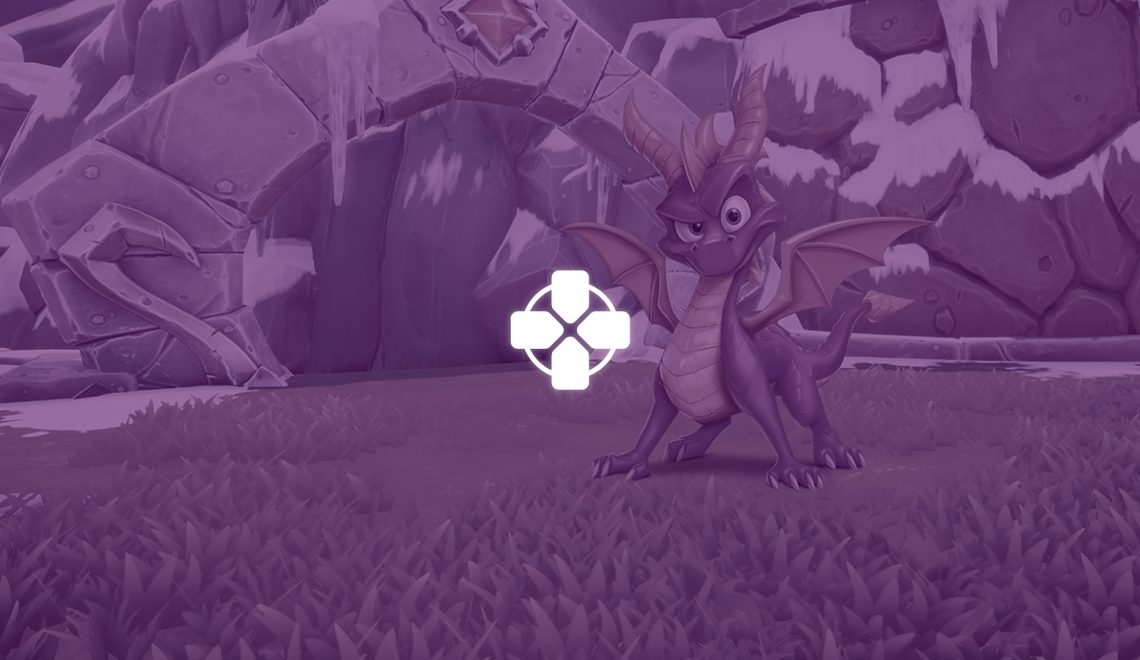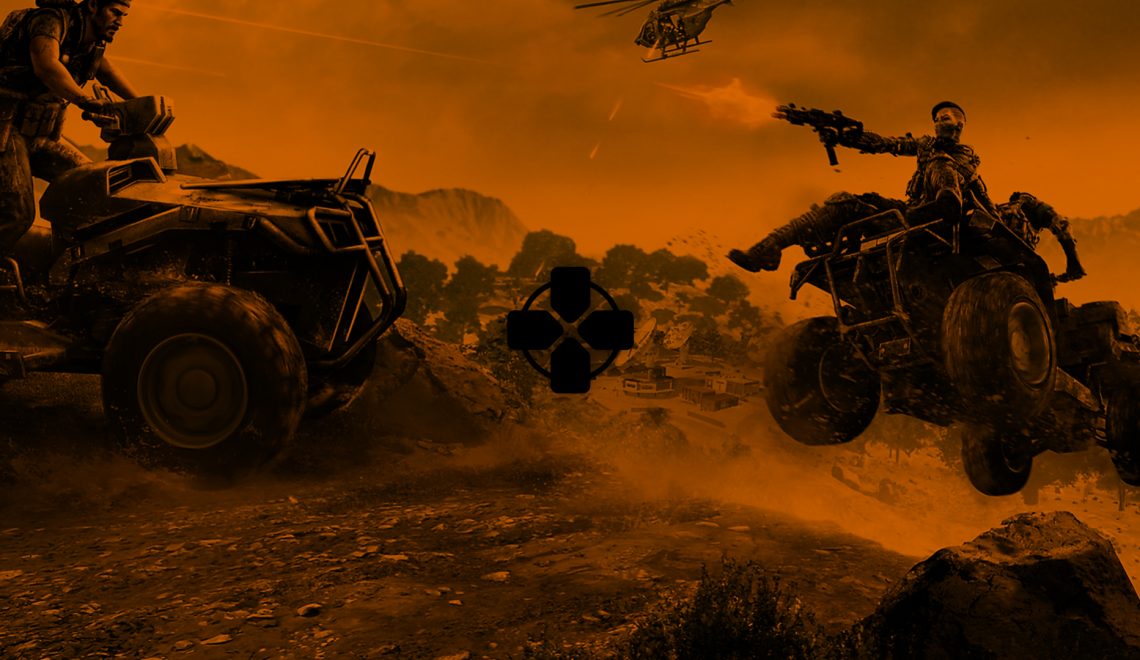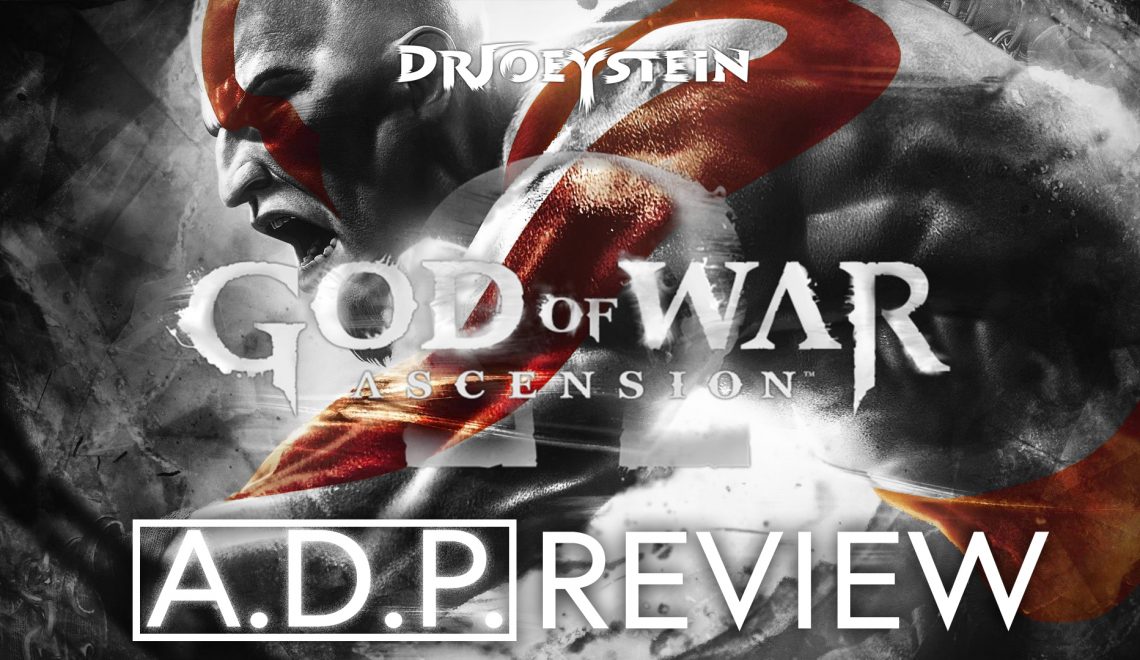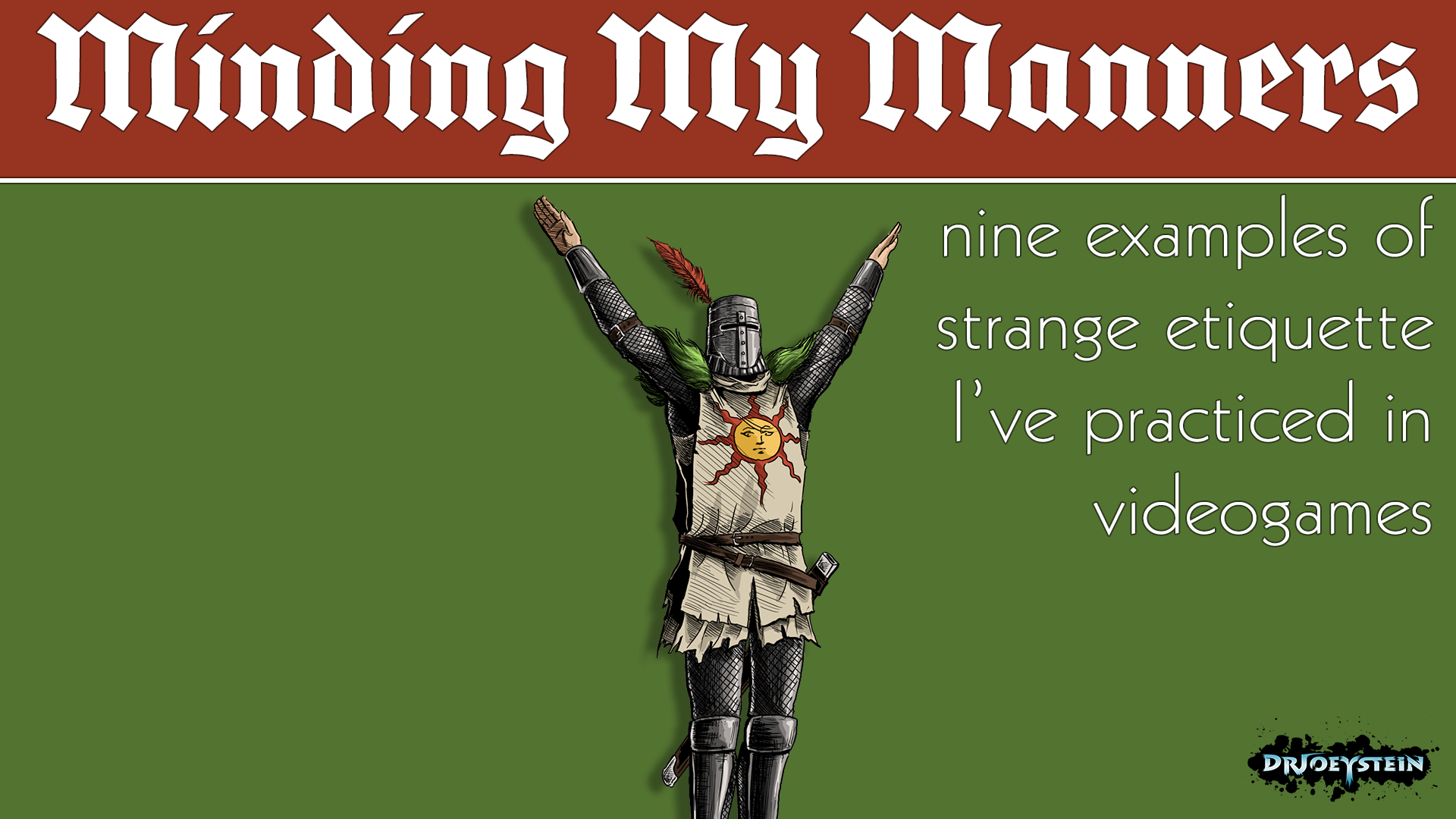
It’s a surreal sight. I immediately recall Matthew 14:22-33 as I saunter across the gray waters of Moonside Lake in Bloodborne. I quickly notice Rom, the Vacuous Spider and her arachnid children in the distance, but as I make my way toward them, the scenery gives me pause.
I’m inexplicably compelled to run as far as I can in the opposite direction and . . . sit down.
A couple of minutes pass as I listen to the eerie echoes and wind. The gentle rippling of water against my garments. This is a special, one-of-a-kind place to have some true peace in an experience fraught with dangers around every corner.
Okay. Now I’m ready for Rom, but before I turn my wrath against her, I perform a quick Pray gesture in a plea for guidance and protection from . . . who? Wait, what am I doing?
I’m suddenly brought out of my immersion. Why did I waste my time doing those things just now? I can’t think of anything, so I shake my head and forget about it. I need to be in the game for yet another tense, masochistic ritual of death.
This was one of those rare times where I’ve felt compelled to do something in a videogame that’s useless yet feels instinctively right. Saluting other players with sportsmanlike emotes is one thing in any Souls title, but sitting or praying before encountering a boss? That’s not normal. It’s just as uncommon and surprising as meeting Solaire of Astora in Dark Souls. His jovial optimism doesn’t do him much good in a land of Hollowed husks, but it doesn’t go unnoticed by players. In fact, I think his behavior rubs off on a lot of them with how they might treat other NPCs, summoned or invading players, and so on.
I have my reasons for doing that sitting/praying incident upon deeper reflection, and I’ve realized there are other things I’ve done in videogames that could be classified as odd etiquette, which I’d define as in-game behavior that’s respectable (in numerous ways) but unnecessary or unexpected in application. We all have our own morals, quirks, and manners. I’d wager that they’re intimately displayed in these moments where bits of our humanity and identity shine through the characters we play as, so how about some examples?
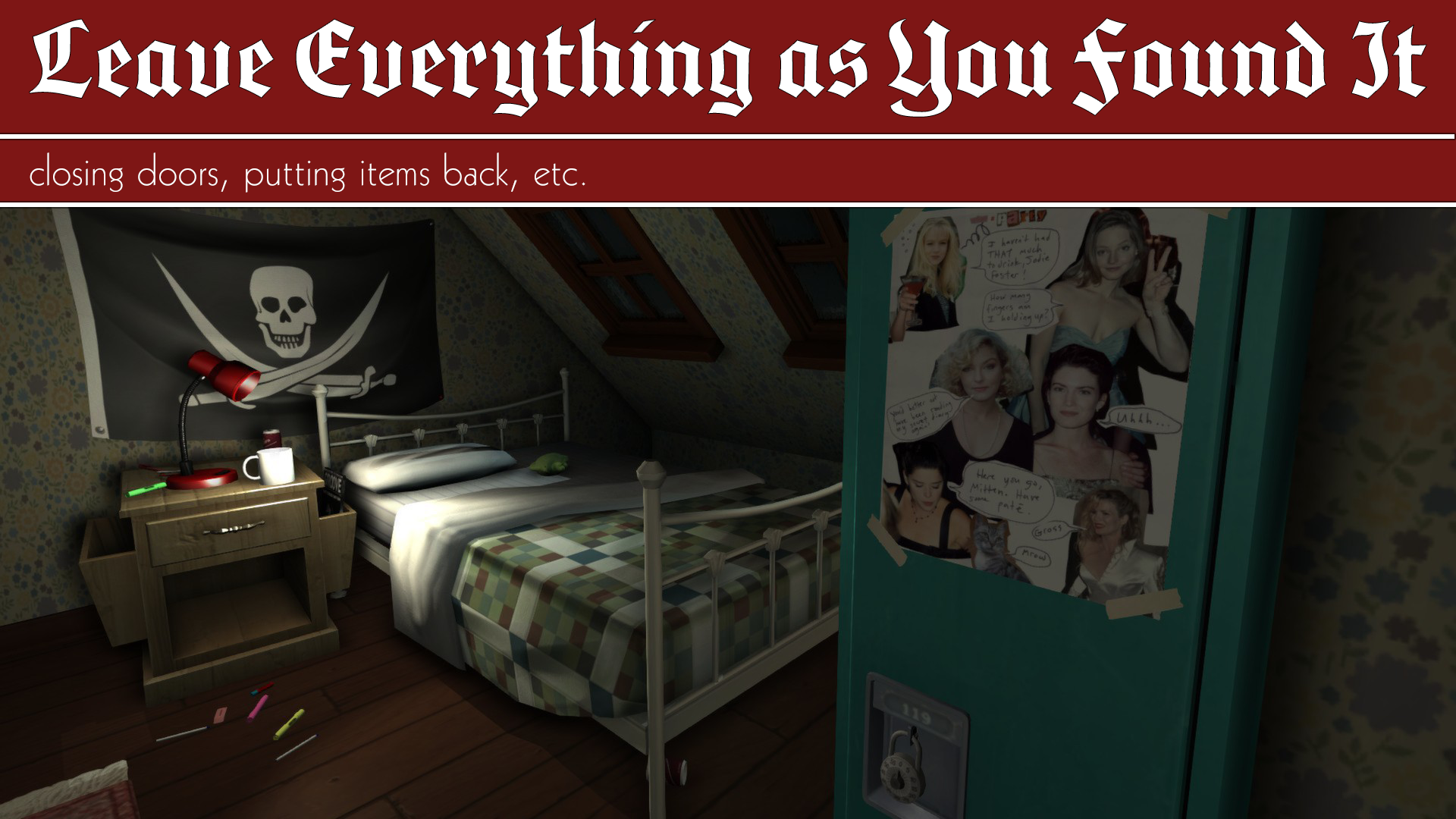
Have you ever started a small cleaning project like organizing your drawer? Only to have it evolve into a four-hour long tirade of sorting out an entire room? I’m prone to do this if I don’t control the urge, which is why I usually fail reigning this back when I play exploratory titles like Gone Home and SOMA. Items are purposefully ordered and strewn around the environments, so whenever I pick up an apple or flash drive, I need to put it back where I found it. If I open a door that was shut (or vice-versa), I close it back up if I leave. This is especially true when I have a customizable home/HUB area with Pokémon Alpha Sapphire’s Secret Caves or Animal Crossing’s humble abodes. Everything has its place, and orderliness in digital worlds is no exception for me. It’s even worse when I don’t have much control over dropping items, such as in The Elder Scrolls V: Skyrim. I’ll awkwardly position my character to put something back on a table or in a tight corner . . . the things I do.
The opening of Wolfenstein II: The New Colossus (vague spoilers ahead) begins with tragedy. Not only is Blazkowicz handicapped from the events of the prior game, but Frau Engel captures one of your closest friends and murders her before your eyes. It’s a scene that’s tough to stomach, and once I assumed control again, I walked over to my friend’s decapitated body wondering if I could do something. Anything. All that happens is B.J. helplessly whispering her name in pain. It sent chills down my spine.
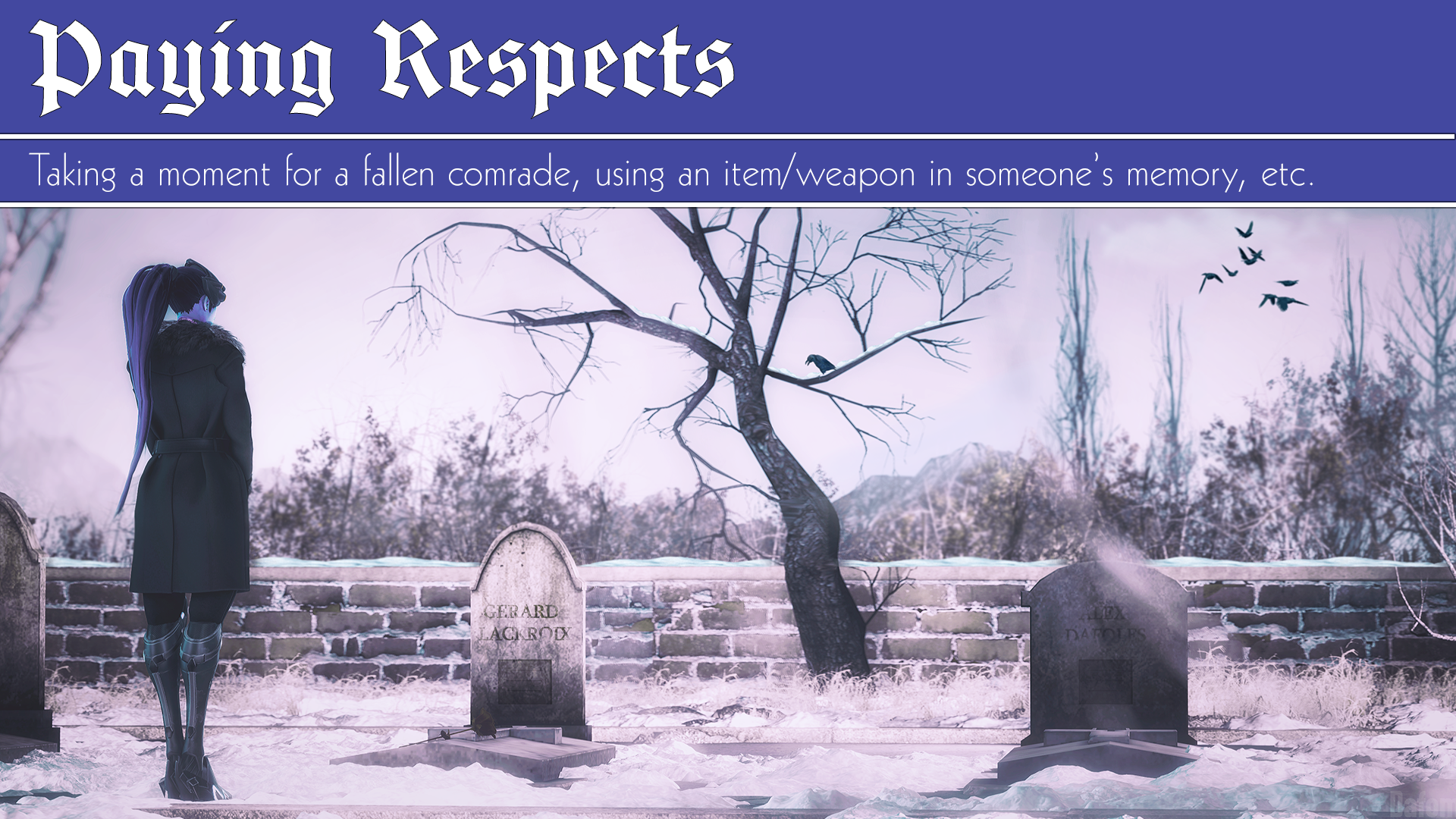
I can’t remember what game it exactly was, but I’m going to say it was Skyrim. There was a point where a comrade of mine had perished in the middle of combat. Once the bloodshed had ceased, I stood above his body wishing I could stay or properly bury it. I couldn’t do much and had to move on, so I dragged his body to a nearby monument and laid his sword on his chest. It’s the least I could do for someone who helped me so much. It’s a natural instinct of humanity to honor the dead. I wish more games (particularly the open world variant) allowed players to act upon this.
Despite having never played it, XCOM understands this by giving players the option to extract dead squad members from a battlefield, playing into people’s inclination to leave “no man behind.” What’s even better is how gear and equipment can be salvaged from their remains to be used by other teammates, which is a wonderful way for them to live on and have indirect revenge. I’ve found myself doing something similar by picking up weapons from dead soldiers to avenge them in some way. With this in mind, what if weapons persisted beyond levels? Wouldn’t it be amazing if you could carry them to the end? What if they had unique flourishes or you could give them special names? What if a game allowed you to mechanically seek amends for accidentally killing an innocent NPC? Developers underestimate players’ morality in this area even with “inconsequential” characters, and when it comes to prominent ones, we often try and find ways to honor them in some manner when they fall. The infamous meme “Press F To Pay Respects” may have been poorly executed in Call of Duty: Advanced Warfare, but I loved the spirit of the idea. Developers can do better.

Transistor downright confused me with a mechanic that had no apparent use: humming. If you hold down a button, the lights dim around Red as she hums along to the melody of whatever track is playing in the background. Why implement it? I was too shortsighted to see it then, but I bet one reason was to move players to reflect on Darren Korb’s phenomenal music and Ashley Barrett’s strong voice. Besides, there were plazas and alleyways in Cloudbank City that felt inviting for Red to sing in that gave me moments to take in the mood of it all. Transistor‘s artistry was all the more apparent when I did this, and I’d say it speaks for countless times where I’ve set down the controller to just look at and listen to a game. I’ve left Destiny, The Last Guardian, Spyro 2: Ripto’s Rage!, and The Legend of Zelda: Breath of the Wild running in the background simply because I love their ambiences. As I said earlier, Bloodborne‘s Moonside Lake captivated me with its scenery. I was moved by the tranquility it inspired within me that I expressed through meditative and reverential gestures.
One way people love to express their love for gaming environments is through the photo mode in PS4 titles like Horizon Zero Dawn, Uncharted 4: A Thief’s End, and inFAMOUS: Second Son. I love it because getting that perfect screenshot is so rewarding, but I hate it too since it constantly interrupts gameplay flow by my pausing every two seconds. However, it’s made me realize that gameplay doesn’t have to constantly engage me for a title to immerse and entertain. Just admiring the sights and sounds is enough to hold my attention sometimes. You could even apply this to the temporary wonderment of unexpected AI behavior or actions, clever design, etc. You know, silly things like the fleeting joy of finding out you can pet an animal in Assassin’s Creed Origins, realizing that some NPCs in Bloodborne will return a gesture if you give them one, or stumbling upon a hilarious line from a character if you’re wearing something specific in Breath of The Wild.
In regard to the appreciation of visuals and sound, I recommend checking out the Ultrabrilliant and the ASMR Geek YouTube channels. Their respective devotion to highlighting these undervalued aspects of videogames highlight how important they are for astounding our imaginations beyond gameplay. This isn’t a matter of being polite to in-game characters, but toward the developers themselves. And I’ll give a shout out to VinceteProD. You’ll have a newfound amazement with games like Battlefield One and Star Wars: Battlefront. I promise.
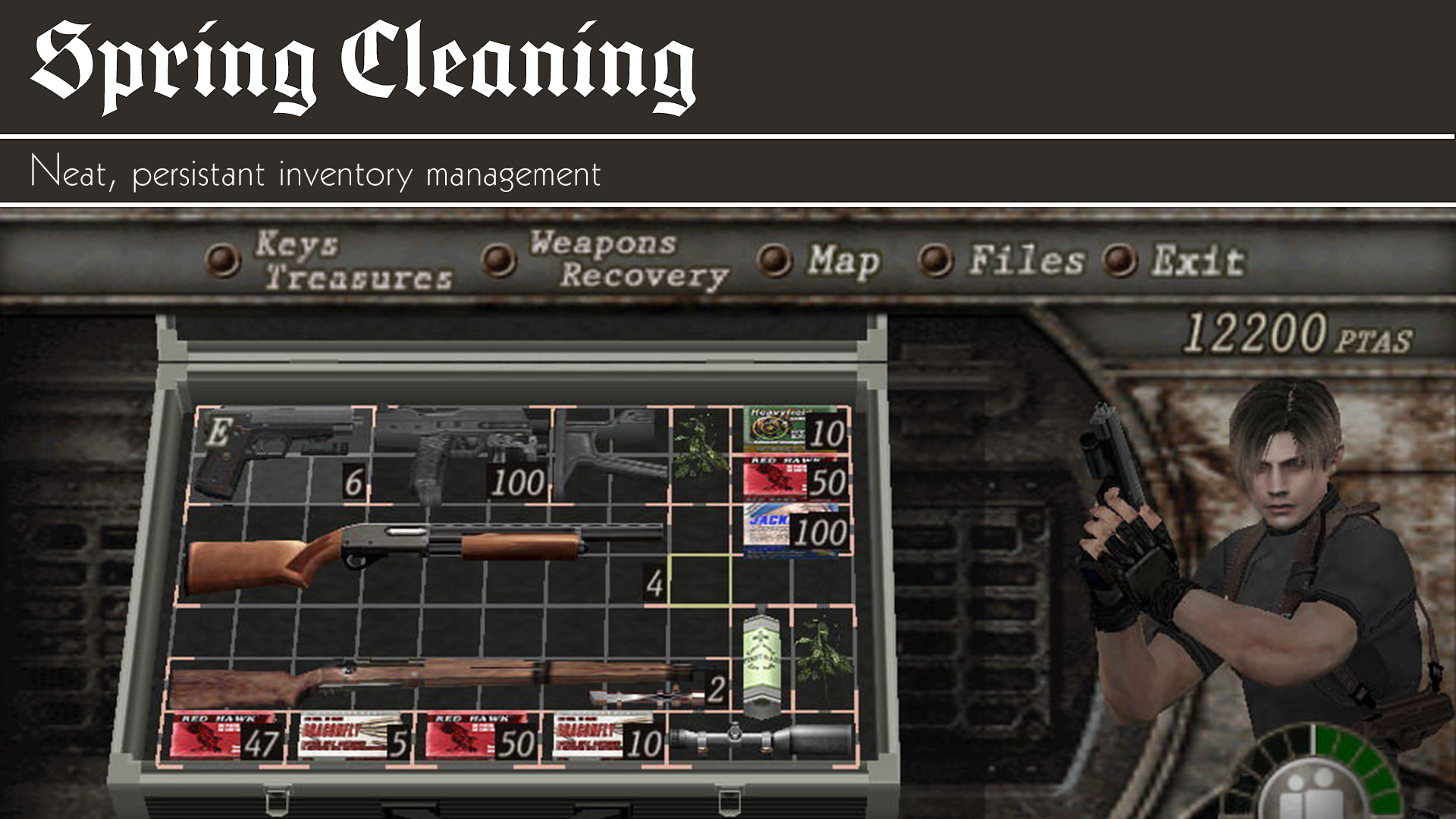
Ugh. Cleaning again? You must think I have an OCD for it. It does run in the family with my crazy father, but thank the Lord it didn’t rub off on me completely. Besides, I’m more of an orderly person than a clean one as I implied earlier, and you don’t have to make an astute observation to discover why that’s true whenever inventory management is present in videogames.
Whether it’s an RPG or an MMO, I make a practice of sorting my weapons, armor, and miscellaneous items. If I get something new in Destiny 2 or Skyrim, I’m on top of immediately discerning its worth so I can avoid cluttering my stock of stuff, which is why most things are salvaged/discarded before I move an inch. And if I have control over my inventory space like in Resident Evil 4? Oh, that turns into one of those supremely satisfying activities where I enjoy optimizing space to maximum efficiency. It’s a kind of busywork I like to engage in that offers short respites from gameplay to collect myself and make sure I’m prepared for anything. Unlike this being an example of manners toward any specific individual, this is just etiquette for yourself to, shall we say, keep up appearances for your own sake.
I wonder if more titles could make inventory management a bigger part of gameplay though. Much like piecing together a puzzle or having it be impacted by what happens to your character. (e.g. You lose a portion of items if you’re heavily damaged, like being set on fire or struck by lightning in Breath of The Wild.) It’s an interesting proposition to be sure, and it’d be a surefire way for players to pay close attention to their inventories.
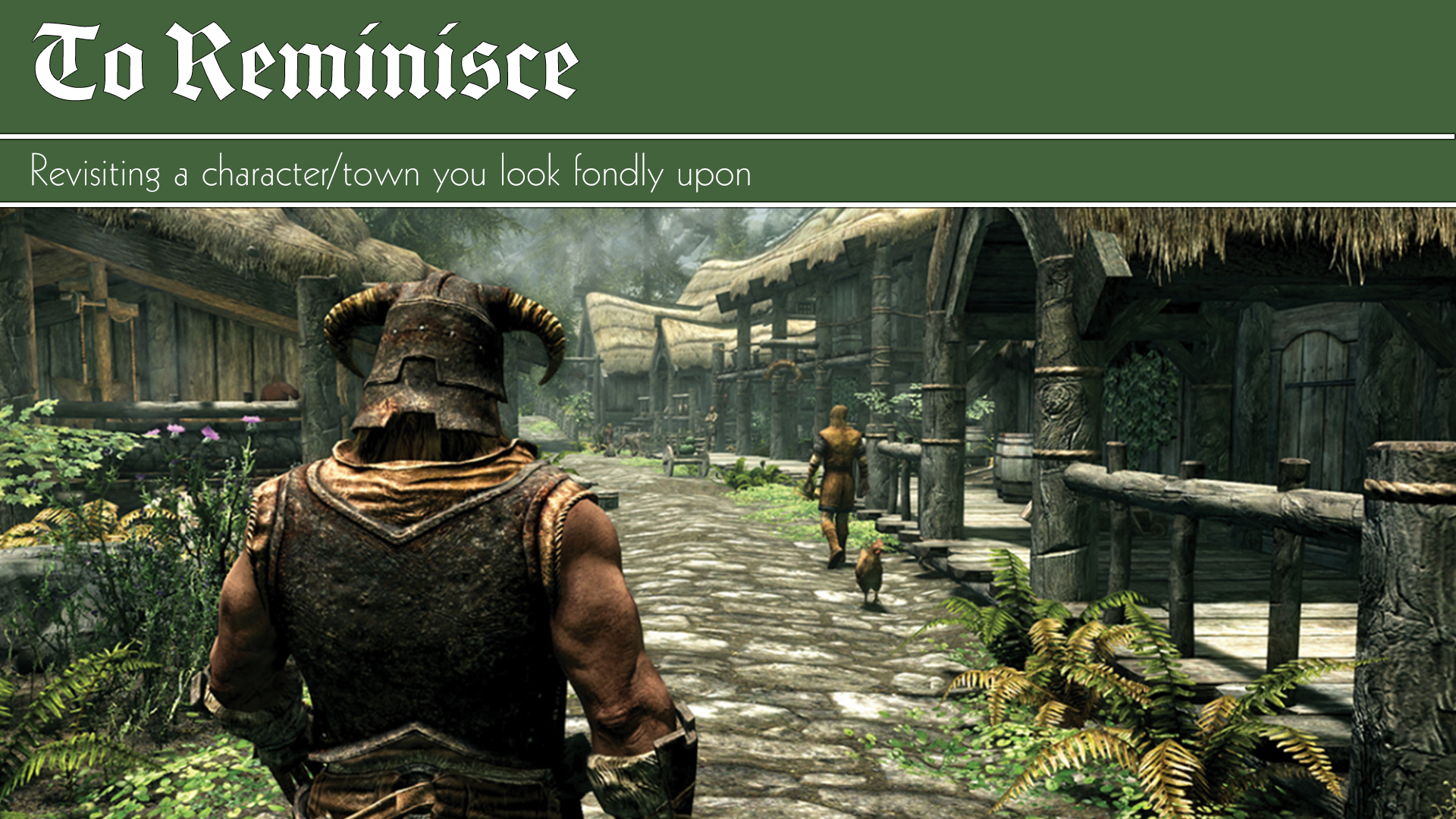
You’re about to make a big change in your life. Let’s say moving to another country for a a dream job. You’ve got to plan where you’ll be living, have your two-week notice ready, get ready to sell off some things, and deal with a plethora of other mundane preparations. However, none of these are human, emotional ways to make a transition like this. I’d say one of the biggest ones we often resort to is visiting loved ones and the places we grew up. It’s healthy and wise to remember your roots as to remain grounded. I tend to do this in sprawling open world games before I close the final chapter.
In the main Pokémon series, I’ve made a practice to revisit the quaint hometowns I started from with my humble starters. Besides, I want to see if mom has any advice before I make my last step to become a Pokémon master. I bided my time wandering around Rosalina’s Observatory in Super Mario Galaxy and Monteriggioni in Assassin’s Creed II, soaking in all that I had accomplished in my journeys before they end. I spoke to several NPCs I liked one last time. In Breath of The Wild and Metal Gear Solid V: The Phantom Pain, I went several hours out of my way to tie up plot lines with some characters I adored.
Can you imagine leaving the country without spending time with your friends and family? “Touching base,” if you will? I can’t, and it shows in my videogame escapades, too.
We’ve all been there. There’s that one escort mission where your AI companion is as slow as molasses. There’s that one character who rambles on and on with endless dialogue bubbles. These are often the greatest trials of being a videogame hero, but there have been some genuine circumstances where I wanted to practice patience. Although it took some time, I never wanted to leave Yorda’s side in ICO despite her leisurely stride. I’d say the obligation was personally and emotionally stronger for me with Trico in The Last Guardian, who I constantly petted, protected, and walked beside. Even though Little Sisters in BioShock 2 are pretty resilient, I was ardent in sticking right by their side as a Big Daddy should. And you know those moments in games where you’re forced to listen to someone as you stroll around a new area for exposition? Instead of frantically running around waiting for the scene to end, I’ll usually slow my pace to a crawl and incline my ear to these characters.
The same goes for not skipping cutscenes or dialogue. To be fully transparent, this is something I’ll often do for the sake of time if I find them pointless, but there have been a handful of characters I didn’t want to cut off. When increasing stats in Demon’s Souls, I always wanted to hear The Maiden in Black’s poetic blessing out of spiritual instinct. Characters of great status and wisdom always have my attention, such as the Guardians in Darksiders or . . . well, almost any character in Wolfenstein: The New Order. It’s all about cultivating interest and investment in others even when your impatience attempts to get the better of you. In an age of instant gratification and speed, we could learn to pull back on the throttle.
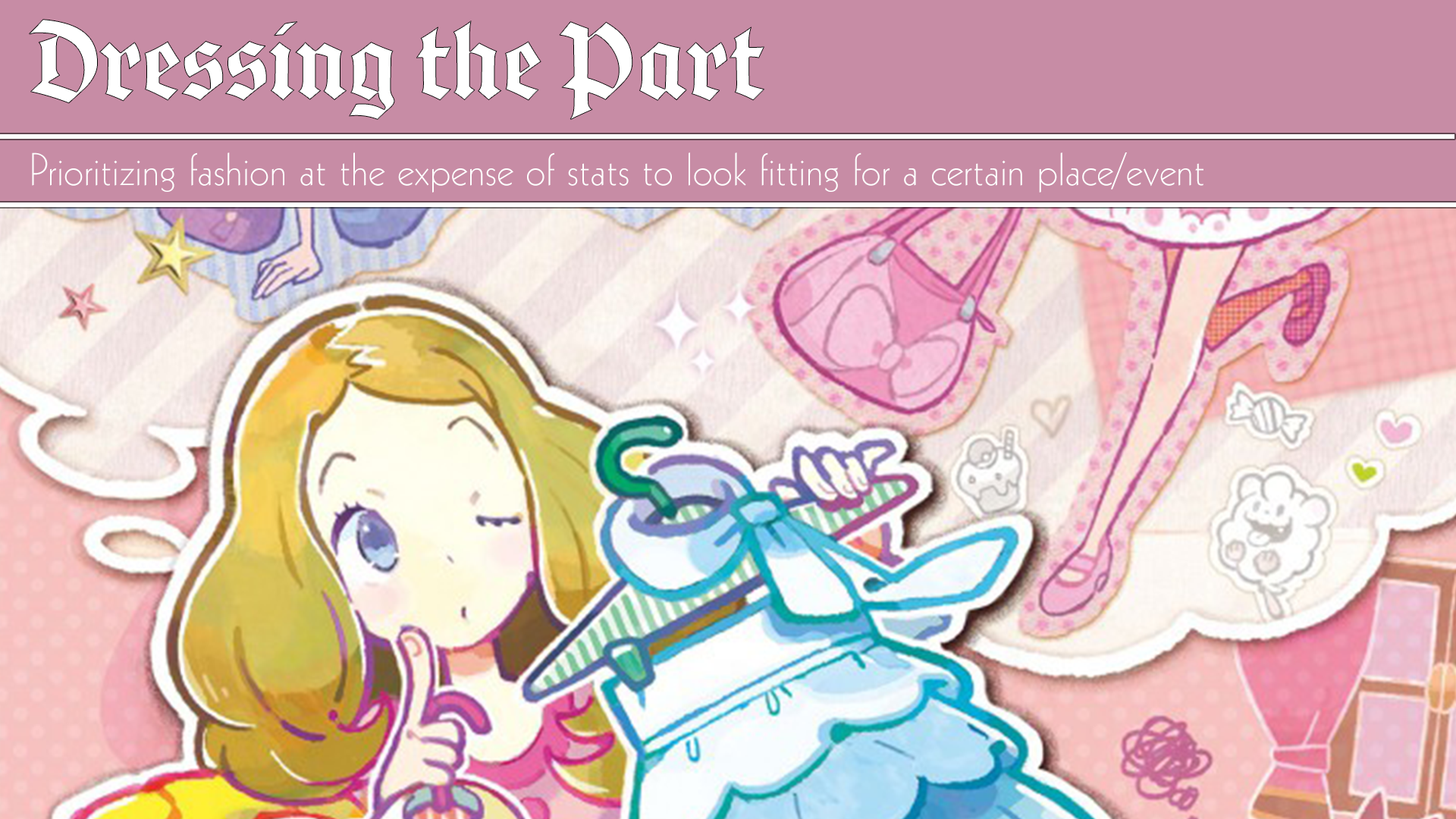
“This is atrocious,” I say to myself as I peer at the Exotic Hunter helmet I just got from Xur. The Foetracer looks like I’m wearing a rusty garbage bin, but . . . hrm, it definitely has better stats than my Celestial Nighthawk. I don’t give a flip. I shove it in my inventory and wear my anthropomorphic bird mask with pride. It suits me and matches my outfit more.
Objectively speaking, this is an approach that might just cost me a Nightfall Strike, but why would I care about that if I look hideous doing it? You’d be surprised how often I—along with many others—abide by this flawed approach for numerous reasons depending on context.
Sometimes, your clothing doesn’t impact your performance at all. Dying your robes in Assassin’s Creed or playing around with your Pokémon Trainer’s appearance is all for show, which might dictate what outfit I’m going with depending on the town I’m visiting. Something like Breath of The Wild demands frequent wardrobe changes depending on Link’s environment, but sometimes I’d stick with certain pieces of armor and gear that looked, well, spiffier. Speaking of Nintendo’s latest masterpiece, at one point you’re actually tasked with cross-dressing in Gerudo Town since “voe” (males) aren’t allowed inside. It’s a great (albeit forced) example of dressing up to merely fit in with any given place. Faron Grasslands? I want to wear climbing gear. Zora Domain? Time to strip. After all, Prince Sidon lives here.
Admit it. We’re concerned about how others think of our appearance to some extent. We love to weave aspects of our identity into what we wear based on our mood and circumstances, but in videogames, much of our practical reasoning can go out the window to express ourselves for the sake of being unique.
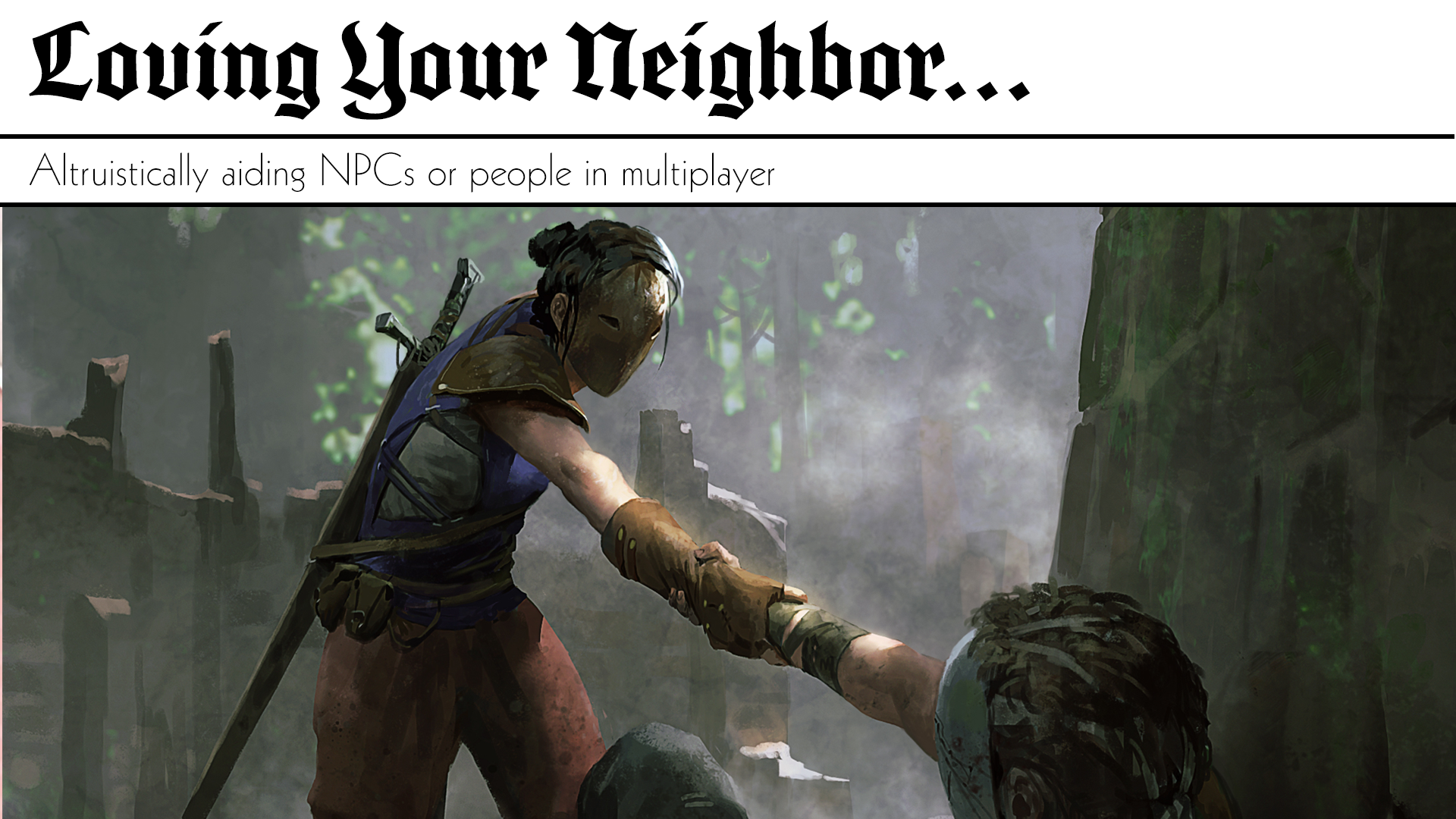
Sometimes I wonder why I bother saving people in the likes of Dying Light and Assassin’s Creed. I’m probably never going to see these people again, and they’re either worth a bit of EXP or the completion of an inconsequential side mission. I should ignore them . . . but how can I? A cry for help isn’t something I brush aside lightly, so I always try to help the least of these even when it doesn’t really benefit me. It’s in my nature, whether this involves giving away resources to civilians in Tom Clancy’s The Division or tipping strangers in Pokémon X or Y.
What’s even better are people who selflessly give up their time and resources to help others in multiplayer games like Dark Souls, Destiny, PUBG, and Absolver. I could go on and on about people who gave me items, helped me complete a mission, and showed me the ropes of how to play more effectively. Whether these actions are altruistic, mutually beneficial, or even a bit selfish, it nevertheless can brighten someone’s day when you show them a bit of kindness that goes above expected cooperation or friendly competition.
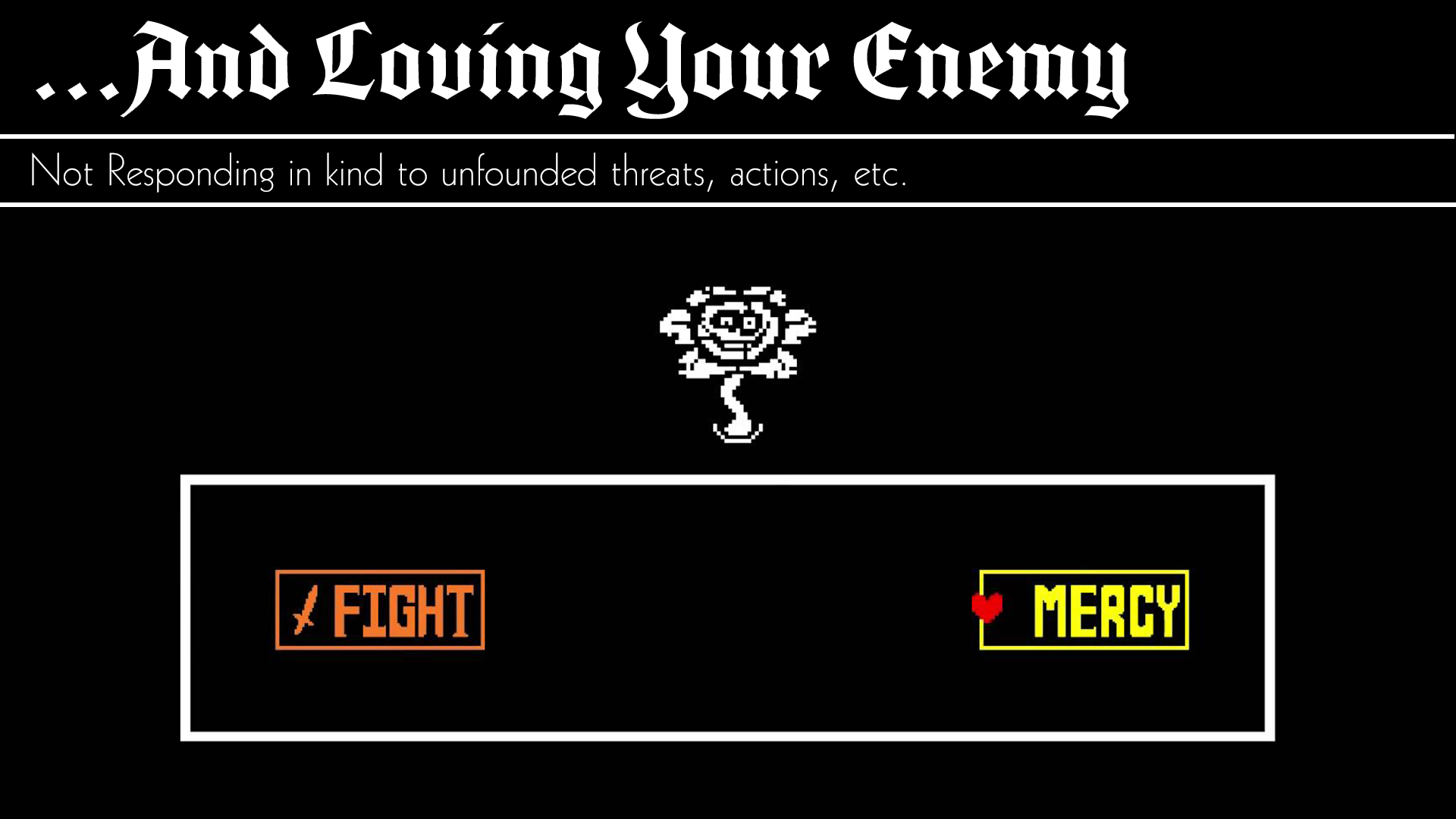
“. . . Why are you being . . . so nice to me? I can’t understand.”
There is nothing so beautiful in this world than mercy: sparing punishment on a deserving person in a display of unmerited forgiveness. It’s one thing if the person in question instantly sought to make amends, but if they don’t regret their trespasses, extended mercy then becomes unfathomable grace. I truly believe it’s the most powerful, effective means to transform even the most wicked of people. Undertale hammers this home by motivating players to do the pacifist run that pushes you to “kill” with your heart, not your fists. In doing so, you have to be willing to accept victory in defeat. Videogames aren’t naturally good at conveying this notion in the slightest, but some have proved otherwise.
As I wrote in an article for Gamechurch, Pyre taught me to accept the honor in losing, even intentionally at times for the sake of others. I’ve found myself attempting to do the same in competitive titles where I’ve allowed opponents to recover if it seems fair. In Super Smash Bros., I’ve jumped off ledges to level the playing field if I know my foe made an honest mistake. I always attempt to do my part instead of griefing or ignoring toxic teammates in Overwatch. I played the entirety of Dishonored without alerting or killing a soul even though I had every reason to be loud and murderous. The list goes on.
That’s the idea, isn’t it? You have excuses to get even with villains in a campaign or trolls in multiplayer, but persistent good-naturedness and selfless action speak in far greater volumes. This goes beyond mere manners.
Just like my last article, this is one of those lists that’s been highly subjective. What does it mean to play politely? It can entail having good manners in regard to your well being, others (NPCs and real players), and even developers . . . if that makes sense. It results in dwelling on a confusing mix of things, but either way, I think it’d be a good idea to consider how your gaming manners are manifested—whether inconsequential or meaningful—the next time you boot up your next adventure or multiplayer match.




